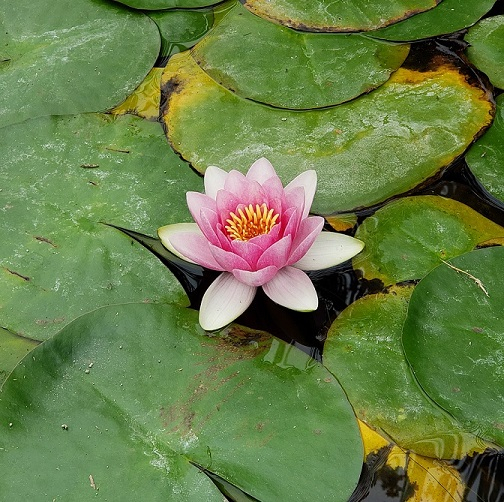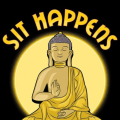Welcome home! Please contact lincoln@icrontic.com if you have any difficulty logging in or using the site. New registrations must be manually approved which may take several days. Can't log in? Try clearing your browser's cookies.
Ego must go
 FleaMarket
Veteran
FleaMarket
Veteran
in Mindfulness
In the process of uprooting some of my abrasive qualities, my ego slipped out and I hurt a friend's feelings. We both enjoy debate, and while examining some texts in which we took opposite sides I became mindlessly critical of his methods of processing information. I hurt his feelings and feel I owe him a heartfelt apology.
I value the Sangha's wisdom so I ask for help with insight:
How to eliminate the ego? Or maybe how to accept another as they are when they are so close in relationship?

4




Comments
Even a Zennist could do well in not trying to eliminate ones ego.
The meditation practice simply calls for us to stop living in thrall to it.
Just giving it, no more or less attention, than you would of any of your other sense gate information channels, can neatly side step suffering's traps of either clinging to it/denying it, or ignoring it.
Ah, I see @how. This then brings me to the question about how to better identify when the ego is encroaching. In this instance it seemed to mask itself as helpful or tag along with some form of analysis or explanation and took over. I was not aware of it until after the fact and maybe I'm a bit sleepy but I'm having trouble seeing it even now in reflection. I just know it was involved but not clear on which parts.
If I follow the emotion experienced I encounter feelings such as frustration and concern. "I" want "my" point understood. "He" doesn't see it "my" way. I can follow the why to that question to find many more questions such as concern for his welbeing which is apparently my problem, and also my own self-interest in persuading him to join me in my perspective. I can continue in this fashion with some effort...is this the way to do it?
Then apologise. Job done.
Nobody but you sees it your way. That is the same for all of us to a lesser or greater degree.
Fortunately I am always right about how wrong I am … who cares? Not me.
https://www.mindful.org/a-guide-to-practicing-self-care-with-mindfulness/
I did some contemplating on what's been said and see now some quick growing attachments to wrong views sprouted and muddied the waters.
The body and mind rebels against losing their stuff they like and having to do stuff they don't like. It mucks up the view with discomforts and so on. It seems such an easy thing to forget how to get out of the way once more, and so short lived when it's done right.
Frustration over obstacles, stagnation, or backwards progress is just a form ego takes to lure the self back into making decisions based on hindrances. This back and forth is beginning to feel more taxing than I'm used to, but even that is likely a misdirection.
Not knowing when to act, when not to act, and what to act on and what to not act on is giving me quite a headache lately.
@lobster Thanks, It was well received. I'm just bogged down in ignorance and delusion like usual.
It is usually about becoming more sensitive, and paying attention to that sensitivity. It’s very easy to ignore your more sensitive nature, but instead to learn to listen to that little voice which tells you stop, you’re going too far, or you’re about to say something hurtful, and then to change your mind and say something softer instead with a slightly different meaning.
It is said, the mind is just your thoughts, or the ego doesn’t exist. The ego is elusive, it hides in amongst other impulses, but sometimes it makes a charge and grabs the reins. If you stay humble and stay sensitive, then it doesn’t get the chance.
Living in sensitivity is a good answer, it means the hardness of the ego slowly gets lost as sensitivity becomes a habit.
This may sound a bit odd but to me, it is as if the ego is a tool we use as individuals even while the individual is a tool of expression for the absolute. Seeing the sense gates and even the individual as tools of expression makes it easier to deal with and govern, conventionally speaking.
We are all inclusive... Be nice.
That is true. It is easy to say, not too lose, not too tight, but in reality there are a number of different factors that come into play, such as the right amount of determination, being able to set aside the impulses various hindrances generate, and so on. It is an accumulation of progress on the path to reach the point where the analogy of the strings on a musical instrument even makes sense.
What I would say is being relaxed, doing one thing at a time and observing whether that was beneficial or not is generally a better approach then trying to do three things at great speed and getting confused about what’s happening. Go slow, one step at a time, like a walking meditation. And don’t forget, more often than not easy is right.
@FleaMarket: Thanks for sharing this. I do this as well from time and time and regret saying something that was not skillful or not shared at the right time. I'm not sure if it helps, but I have tried to pay closer attention to my thoughts and body before I might say something that I would regret. I've noticed that there is very slight (and I do mean very slight) shift in energy before I speak if I might say something unskillful. It's almost like a pull to speak - as if "I know better" or "I have to share right now." The urgency and pull has typically indicated to me that I might need to wait and sit through the urgency. Then, if I still feel the need to speak later, I can do it in a skillful way. Often, the urgency drifts away and I realize that I really didn't need to say the thing I was thinking. I'm not sure if this is helpful, but paying attention to this energy shift and attitude shift has been useful for me. I still mess up sometimes, but a little less.
@FleaMarket, I just thought of another teaching that I find very helpful.
Thanissaro Bhikkhu's description of Right Speech has helped me very much. He says to ask yourself three questions before you speak:
“Is it true?”
“Is it beneficial?”
“Is this the right time to say something pleasing or is it the right time to say something displeasing?"
An excellent summary of his teaching is here:
https://www.dhammatalks.org/Archive/Writings/CrossIndexed/Published/Meditations11/090828_ThePathtotheTop.pdf
Thus have I heard...
"By trying to get rid of something, one is unconsciously granting it reality"
Which reminds me...
"One is simple one's experience...
One's ego is the abstraction from these experiences...
One's ego should be viewed as a convenient analytic device"
Hmm The Ego...Can't live with it ...Can't live without it there has to be another middle way...
I had not heard this line before but it connected with me in a way that begs further investigation. Seeing the ego as non-existent or in the same realm as thoughts is rather relieving and fits in to other elements floating around in my understanding.
My ego's a cad. Checks out.
Thank you all for you input. These and many other points made have helped open my eyes and given me places to explore.
Yes, it rather struck me the same way. “The mind is just a bundle of thoughts” was what I came across, and the ego is an illusion, a distortion made up of past disappointments and injuries.
It rather supports a view that has been forming in me that as children we are much closer to the source of life, the original being, the luminous nature. Then as we live trauma’s slowly accumulate and make us what we are later in life, wiser but no longer as innocent or pure.
The task of a spiritual seeker is to make supple again what has hardened, to remove blockages so that life’s juices can flow, to cherish the things in us that have been damaged, to stay close to loving and laughter.
The emotions have a mind of their own, so too the body. So too the subconscious. In one sense it is 'all Mind'.
There is also
a superconscious/integrated/emptiness/stillness/God mode/Buddha Nature/
… many names, ultimately 'nothing special' … and yet …
This too comes and goes, ebbs and knows, flows away and into an emptying ocean of wonder …
Ego this way
Ego that way
Ego no way
Ego is ok
It is when ego exceeds wego that it becomes an obstacle.
When we say, "I am better than you" or "I am smarter than you" or "I am stronger than you" or any number of those "I am.." iterations, that we slam into that wall.
The open hand brings much more than the closed fist. The smile draws more than does the sneer. A friend is worth more than 1,000 reluctant companions.
When you stoop down to help another, you both rise together.
Peace to all